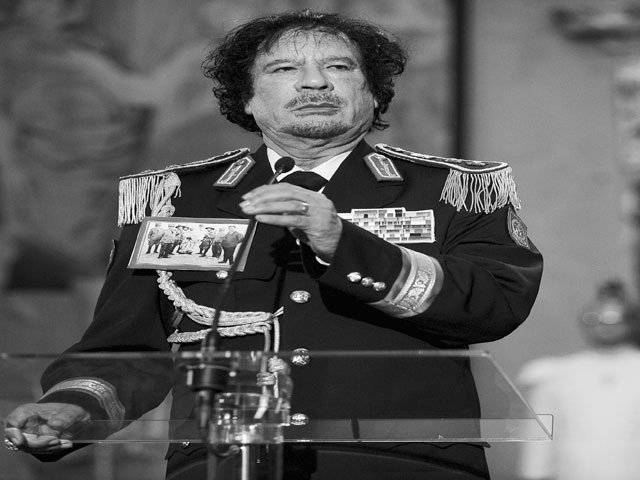Was he a mad dog as Ronald Reagan dubbed him, or the King of Kings as some leaders of African nations crowned him, or Brotherly Leader and Guide of the First of September Great Revolution of the Socialist Peoples Libyan Arab Jamahiriya, as he named himself in 1972? Whichever title describes him best, the fact is he was different things to different people, and the murkiness surrounding his character and contributions to Libya or lack thereof remain murky in these days following his assassination. That too , remains murky: did a young Libyan rebel shoot him, or was he killed by a Nato airstrike? Facts around the achievements of his socialist policies remain similarly debatable, though reports of the Human Development Index as recently as 2009 gave Libya the highest ranking of all African countries, with a GDP that was fourth highest in the continent. Citizens had access to free health care and education and indeed, from having only one-fifth of its citizens able to read and write before he took power in 1969, at the time of his death, Gaddafis policies could boast an 83% literacy rate. His government also handed out 50,000$ to every couple on their marriage to help them secure a home, and bank loans accumulated no interest. His regime also became known for supporting terrorism around the globe (particularly against Israel), and though Libyans were arrested and indicted for the Lockerbie bombing, it has still not been proved that Libya under orders from Gaddafi had anything to do with it, nor why if so. Meanwhile, his relationships with womenparticularly his female bodyguards also known as amazons including his Ukrainian nursescertainly seemed bizarre to say the least, though one of his nurses upon learning of his death claimed she was very saddened by it and by the fact that none of the elite female unit who surrounded him was by his side at the end. The woman, Oksana Balinskaya, also went on to say she and her other colleagues had a good life in Libya and that she would like to go back to the country to live once the dust settles. She did not condemn Gaddafi, but said he had been a good boss who paid them well, and that her life in Libya was much better than anything she could look forward to in her native Ukraine. Yet we are told that Gaddafi was a tyrant, who lived a life of immense luxury while his citizens suffered from economic deprivation and political repression , and that Libyans are now free and rejoicing after his ignominious end. So what do all these conflicting accounts add up to? What is the truth? Third world anti-imperialist hero and womens libber, or rabidly repressive tyrant with a rapacious lust for women? All I can say is, from my personal viewpoint as the young and idealistic 14 year-old Pakistani girl I was when the dashing Col. Muammar Gaddafi arrived for the 2nd meeting of the Organisation of Islamic Countries (OIC) in Lahore, Pakistan, in the spring of 1974 when a whole generation was as green as the grass of Lahores numerous parks, the man represented hope for the third world against the imperial West and what a package that hope came in He looked good, tall and handsome in his military uniform ( even though we knew better than to trust dictators in the guise of soldiers but we were girls of a certain age after all, and prone to romantic swoons at the figure a young man in uniform cut in front of our dazed eyes)and he sounded even betterthat potent mix of revolutionary zeal combining the best of Islamic ideals of economic and social justice with the even headier language and concepts of western socialism. We all believed he meant what he saidwe so wanted our leaders to stand up against the tyranny of a capitalist world order that was clearly dividing our world into one of haves and another of have-nots. And despite his descent into megalomania and crazy behaviour, I 'd still like to believe he retained some vestiges of that early promise. Yes, he died in a manner unbefitting a hero.but then, he had ceased being that to many in his country. But to others, both within Libya and elsewhere, he encapsulated the image of the resistance fighter, lobbing ill-advised and even insane comments and braggadocio at his militarily superior enemies, someone who some of the time at least, spoke truth to power. And perhaps for that, he paid the price. Fawzia Afzal-Khan is a Professor and University Distinguished Scholar in the Department of English and Director of Women and Gender Studies at Montclair State University NJ. Counterpunch
Tuesday, April 16, 2024
Muammar Gaddafi: In memoriam

High-level Saudi delegation in Islamabad to hold meetings with Pakistani leadership
2:07 PM | April 16, 2024
Decision to retaliate against Iran attacks rests with Israel, says Pentagon
1:05 PM | April 16, 2024
Elon Musk proposes small fee for new X users to combat fake accounts
1:01 PM | April 16, 2024
Samsung overtakes Apple as top smartphone maker: Report
12:57 PM | April 16, 2024
Pakistan, IMF discussing new multi-billion-dollar program, says Finance Minister Aurangzeb
11:09 AM | April 16, 2024
Political Reconciliation
April 16, 2024
Pricing Pressures
April 16, 2024
Western Hypocrisy
April 16, 2024
Policing Reforms
April 15, 2024
Storm Safety
April 15, 2024
Democratic harmony
April 16, 2024
Digital dilemma
April 16, 2024
Classroom crisis
April 16, 2024
Bridging gaps
April 16, 2024
Suicide awareness
April 15, 2024
ePaper - Nawaiwaqt
Advertisement
Nawaiwaqt Group | Copyright © 2024





